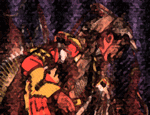FOR IMMEDIATE RELEASE
June 16, 2003
CONTACT:Hanay Geiogamah
310-825-7315
hgeiog@ucla.edu
"Native Performing Artists Believe Theater Can Be Powerful Force for Change In Indian Country"
LOS ANGELES - Prominent Native American artists met June 4 -7 at a national theater conference held at UCLA to address ways to promote more Native theater and the role performing arts can play in helping to build and strengthen tribal communities in Indian country.
"Performing Arts and the Tribes in the New Millennium" was the theme of the 2nd annual conference hosted by Project HOOP, a national Native theater education program based at the UCLA American Indian Studies Center. The conference brought together more than sixty artists and arts administrators to discuss the current state of Native performing arts, the place for performing arts in community development, and to explore ways to increase the presence of Native.
"As Native Americans, artists and involved members of our communities we believe Native theater can be a powerful force for positive change among our people," said Hanay Geiogamah, Project HOOP co-director and a professor in the UCLA School of Theater. "The performing arts is a viable means towards keeping our stories alive, promoting our cultures, languages, and spirituality. Theater can and should be a critical key in helping tribal nations move forward in this new century."
Conference participants agreed that Native artists must lead the way in defining and setting cultural, creative and professional standards for Native American theater because the mainstream theater community has pre-conceived notions about what they believe Native American theater to be.
According to Geiogamah, tribes must become the ultimate supporters of Native artistsí work because funding institutions often support work that embraces mainstream theater values, and production models that do not always reflect the work Native artists create. "It is imperative that we incorporate tribal and traditional ideas, values, knowledge, culture, etc. if we are to secure support from tribes. Tribes are interested in preserving, promoting culture through new means, and theater can be a credible avenue," Geiogamah said. "This is why it is critical that the Native artist find ways to promote our traditions through contemporary theater.
The four-day event included topics on creating alliances with established theater and arts organizations, establishing non-profit Native theater and dance companies, perspectives on the future of Native performing arts from Native youth, and the importance of honing artistic skills in both theater and film. The conference also offered workshops in acting, writing, producing and directing, and an evening performance by the American Indian Dance Theatre.
Attendees included prolific Native American playwrights, Bruce King and Marcie R. Rendon, Jana Rhodes, co-director of the Tulsa Indian Actors Workshop, actors, Jane Lind and Michael Horse, and students from the Project HOOP summer theater workshop at Haskell Indian Nations University in Lawrence, Kansas.
"We have a number of talented and emerging artist throughout Indian country," Geiogamah said. "One of the major goals of this conference was to bring these artists together in order to infuse a national grass roots Native theater movement. By combing our talents and efforts in a spirit of cooperation and support we can create theater that reflects the challenges and struggles within our communities.
Project HOOP (Honoring Our Origins and Peoples) was started in 1996 in order to advance Native theater among tribal colleges, Native communities and mainstream institutions. Project HOOP is the only comprehensive Native theater, education and community development program of its kind in the United States. Project HOOP, originally funded by the W.W. Kellogg Foundation, is currently funded by the U.S. Department of Education's Fund for the Improvement of Post-Secondary Education (FIPSE).

